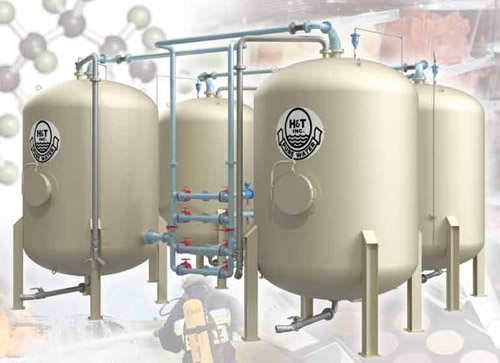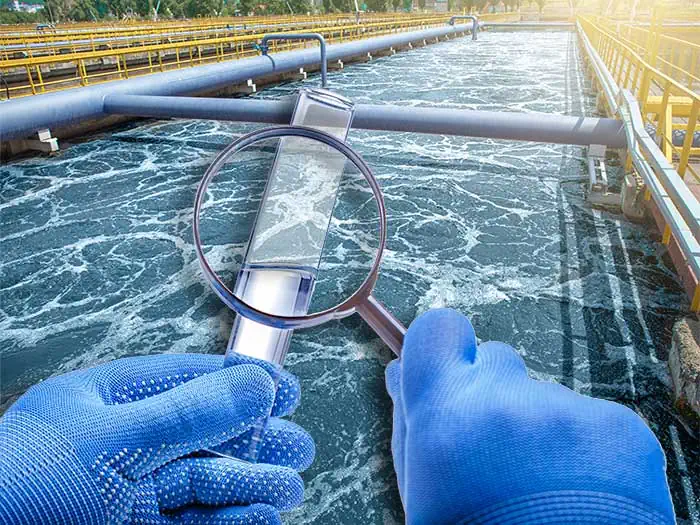M270 PFAS Treatment for Sustainable Waste Management
M270 PFAS Treatment for Sustainable Waste Management
Blog Article
How PFAS Treatment Makes Sure Clean and Lasting Water
The existence of PFAS, frequently recognized as "for life chemicals," poses significant difficulties to water high quality and public health and wellness. The effects of these therapies expand past immediate wellness advantages; they raise crucial concerns concerning lasting water monitoring strategies that should be addressed to ensure a resilient future.

Recognizing PFAS Contamination
PFAS, or per- and polyfluoroalkyl compounds, have actually become a considerable ecological concern because of their prevalent frequency and persistence in the atmosphere. These artificial chemicals have actually been used in different commercial applications and consumer products, including non-stick kitchenware, waterproof garments, and food product packaging, because of their unique properties such as water and grease resistance.
The contamination of dirt and water resources by PFAS takes place largely via industrial discharges, firefighting foam use, and leaching from garbage dumps. pfas management. When released, these substances are resistant to destruction, bring about their buildup in the setting. This perseverance increases important issues, as PFAS can take a trip cross countries through groundwater and surface area water supply, impacting drinking water supplies and ecosystems

Health And Wellness Dangers of PFAS
The perseverance of PFAS in the atmosphere raises substantial health and wellness concerns for people exposed to these materials. Research study has connected PFAS exposure to various damaging wellness impacts, consisting of immune system disorder, liver damage, and boosted risk of certain cancers cells.
The universality of PFAS in customer products, such as non-stick cookware, water-repellent textiles, and food packaging, additional intensifies the danger of exposure. Consuming water infected with PFAS is a substantial issue, as these chemicals can seep right into groundwater sources. At risk populations, consisting of kids and those living near industrial websites, may encounter intense risks due to their creating systems and potential for greater exposure degrees.
As awareness of these wellness dangers continues to expand, regulative firms are beginning to develop standards for PFAS levels in drinking water. Public wellness initiatives are vital to alleviate exposure and shield neighborhoods from the long-term results of these dangerous materials.

Ingenious Therapy Technologies
Just how can we properly take on the challenges postured by PFAS contamination in water resources? Cutting-edge treatment innovations are emerging as crucial remedies in the mission for clean water. These methods concentrate on the removal or destruction of per- and polyfluoroalkyl materials (PFAS), which are well-known for their perseverance in the environment.
One promising approach is adsorption utilizing advanced products, such as activated carbon and ion exchange materials. These materials have actually shown effectiveness in recording PFAS molecules from water. Another noteworthy technology is membrane filtering, which uses nanofiltration and reverse osmosis to separate contaminants at the molecular degree, therefore providing an obstacle against PFAS.
In addition, progressed oxidation processes (AOPs) pop over to these guys employ solid oxidants to damage down PFAS substances into harmless results. This method is especially reliable for treating highly polluted water resources. Bioremediation techniques, employing particular bacteria, are additionally being discovered to deteriorate PFAS.
As research study proceeds, hybrid systems that combine several modern technologies may provide boosted efficiency, attending to the intricacies of PFAS contamination. The development and implementation of these cutting-edge treatment modern technologies are important actions toward guaranteeing the security and sustainability of our water sources.
Advantages of Reliable PFAS Treatment
Properly dealing with PFAS contamination in water resources considerably improves public health and environmental safety and security. PFAS, usually described as "for life chemicals," are immune to deterioration and can build up in the human body, causing severe wellness dangers such as cancer, liver damages, and body immune system disorder. By implementing reliable treatment approaches, neighborhoods can reduce direct exposure to these hazardous materials, eventually improving the wellness outcomes of their populaces.
Moreover, effective PFAS treatment get more adds to the preservation of neighborhood communities. Polluted water can adversely affect aquatic life and interfere with the fragile balance of neighborhood habitats. By guaranteeing tidy water, treatment processes protect biodiversity and maintain eco-friendly integrity.
Furthermore, reliable PFAS remediation can promote public self-confidence in water quality. When communities are assured that their drinking water is devoid of damaging impurities, it advertises a sense of security and wellness. This trust fund is important for neighborhood involvement and assistance for ongoing water management efforts.
Future of Water Sustainability
Amidst expanding problems concerning water quality and scarcity, the future of water sustainability rests on ingenious techniques and joint initiatives. As communities face the looming risks of pollutants like PFAS, the advancement of sophisticated therapy innovations is necessary. These technologies not only focus on the removal of damaging materials however additionally advertise the reuse and recycling of water, therefore reducing overall demand.
Furthermore, efficient water administration plays a crucial role in guaranteeing sustainable practices. Policymakers must integrate clinical study with governing structures to develop clear standards for water usage and treatment. Stakeholder engagement, including local communities and industries, cultivates a feeling of common obligation and motivates sustainable methods across various industries.
Investment in infrastructure is additionally critical; updating aging systems to include contemporary filtering and purification methods can considerably enhance water quality. Furthermore, welcoming eco-friendly innovations, such as natural filtration systems, can provide eco-friendly solutions.
Eventually, the future of water sustainability hinges on an all natural technique that combines modern technology, policy, and community participation. By prioritizing these elements, we can guard our water sources for generations to come, ensuring tidy and sustainable water for all.
Final Thought
In conclusion, the efficient therapy of PFAS is vital for making certain clean and sustainable water. By using advanced innovations such as turned on carbon adsorption, membrane filtering, and progressed oxidation processes, areas can considerably minimize the wellness risks connected with these impurities. Furthermore, the combination of these therapy approaches supports ecological community protection and enhances biodiversity. Eventually, robust PFAS therapy methods add to long-term resilience in water management, fostering public rely on YOURURL.com water high quality and advertising lasting methods.
Report this page